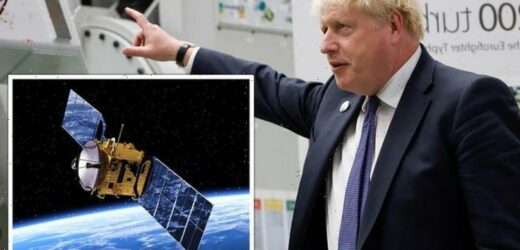Galileo: David Morris outlines UK’s role in project
We use your sign-up to provide content in ways you’ve consented to and to improve our understanding of you. This may include adverts from us and 3rd parties based on our understanding. You can unsubscribe at any time. More info
Brexit Britain was kicked out of the EU’s Global Navigation Satellite System (GNSS) after cutting ties with the bloc. Civil servants and industry insiders have pushed for the Government to revive talks on rejoining – and the EU appeared to open the door to talks. In June, Timo Pesonen, the European Commission’s Director General for Defence Industry and Space, said: “The European Union is open to negotiating with the UK on its participation in the EU space programmes. The ball is in London, not here.”
But Express.co.uk can confirm that the Government has no plans to play ball with Brussels.
Instead, the UK will continue to depend on the US Global Positioning System (GPS) for position, navigation and timing (PNT) services until a suitable replacement is selected.
A spokeswoman from the Department for Business, Energy and Industrial Strategy added: “The UK no longer participates in Galileo as it did not meet our security, defence and industrial requirements.”
The hunt for a UK replacement is now understood to have filtered down to around 10 options that will be presented to the Government in November.


A number of options have already been touted, including the OneWeb low-Earth orbit (LEO) satellite constellation.
The Government has invested £364million ($500million) to acquire the satellite company OneWeb from bankruptcy, in conjunction with the Indian company Bharti Global.
OneWeb was designed as a broadband constellation first and foremost – it will provide rural 4G, and one day 5G, Internet signals across the nation.
But now, OneWeb’s Gen2 satellite is being tipped as a potential Galileo replacement with groundbreaking technology to meet the needs of Government, military, maritime and first responder customers.

It comes after US company Kymeta announced it has successfully tested its u8 broadband terminal on OneWeb’s low-Earth-orbit constellation.
Kymeta and OneWeb performed a series of LEO satellite acquisition, tracking and throughput measurements in Toulouse, France.
It is understood that the technology, could be integrated into the rapidly expanding OneWeb system to allow OneWeb to explore solutions that meet the needs of Government, military, maritime and first responder customers.
OneWeb is working with a portfolio of companies, including Hanwha, which recently invested £200 million in the operator.
Hanwha made the investment via Hanwha Systems, the defence systems division that last year acquired Phasor Solutions, a British satellite antenna start-up.


The group will have a seat on OneWeb’s board.
OneWeb said the addition of one of South Korea’s leading defence groups as a shareholder would bring relationships with new Government customers and an expanded geographical reach.
Neil Masterson, OneWeb chief executive, said Hanwha would also bring “advanced defence and antenna technology” to the table.
Galileo, which will go live in 2026, features a Public Regulated Service (PRS) that can be used by government agencies, armed forces and emergency services.
The bloc decided this “crucial feature” would only be accessible for EU members, despite the UK developing its “brains and heart”.
Source: Read Full Article


